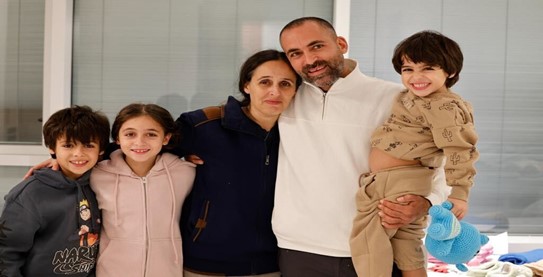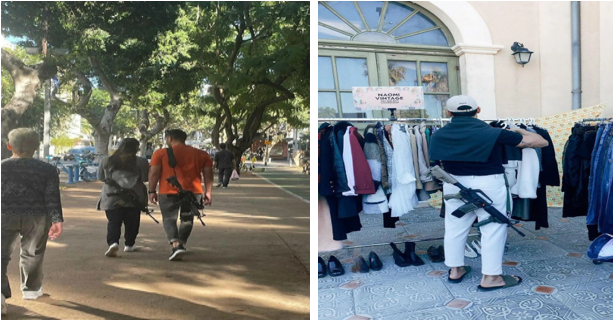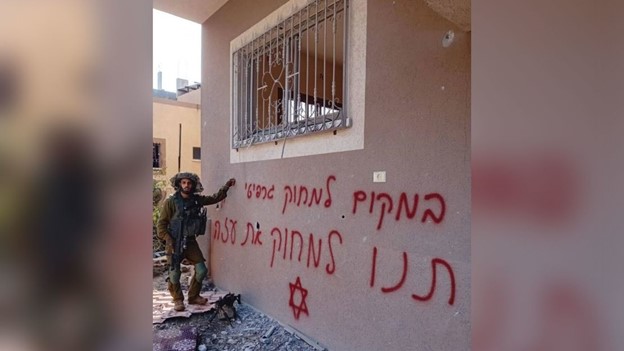Can This Israel Survive In the Glare of The Day?
Hagar Brodutch and her three children were among the Israelis who were taken hostage by Hamas on October 7, and later released in the exchange of captives in November. She and her kids were held in an apartment somewhere in the North of Gaza. As Israel pounded away all around her, she started to grapple with the twin-truths of the October attack:
…it is [her children’s] own Army that was supposed to protect them there in their home, where they instead abandoned them. Now the I.D.F. was shelling them while they are inside Gaza. And it didn’t stop. With each passing day, you tell yourself it can’t be. It doesn’t make sense. They know I’m here. They know my children are here.
Finally, the implications of the Israel Defense Forces’ (IDF) ceaseless bombardment took hold of her: in the state’s calculus, she and her children didn’t really count.

A very harsh revelation, this, one that can seriously fray bonds between citizen and state, much like it severs them between child and mother. In the case of Israel, we all have been taught to believe the ties between Israeli Jews and their state are especially sacred–and we secretly envied them.
Hagar no longer harbors any illusions about her place in her motherland’s priorities. What has yet to crystalize is the meaning of this loss of innocence–in her and inevitably in Israeli society. Because as the IDF continues to reduce much of Gaza to rubble with no consideration for the abductees, a growing number of Israelis are registering the same discovery Hagar came to very soon after she was set free.
This is not the only truth that has been wrenched out of its hiding since October 7, but it is core to Israeli identity. Ominously, it stands as a counterpoint, a betrayal, to the conviction that seized Israelis after the 1967 epic victory: a people and its army in an eternal embrace as they fulfil their manifest destiny.

As you read Hagar’s words, you have to wonder, What does October 7 really mean for Israel’s state and army? How does their fury over the slain residents of Be’eri and Nir Oz mesh with their disregard for the hostages? How does wreaking hell on them in Gaza tally with anguish for their murdered friends and kin back home? Because, for all intents and purposes, that’s what the IDF is doing. A bare majority of Israelis might still believe that one of the main goals of the war on Gaza is to free the hostages, but most of them are sure to be joining those who have already caught on to this and other deceptions, foremost among them the feasibility of pulverizing Hamas into oblivion.
So what is Israel left with a full three months into a kind of slaughter in Gaza that has cast it in much of the world as a genocidal, ethnic cleansing state? Israelis’ outrage at the indictment is hardly relevant beyond its utility in laying bare the frightening gap between how they perceive themselves and how the world perceives them. True, there is cover from the US and the European Union but, frankly, it matters only to the extent that it has unmasked these two and left threadbare their so-called lofty rules.
Critics of the Israeli government suppose there is salvation in the sinking of Prime Minister Netanyahu and his ship of fools. But what in the behavior of Israeli Jews themselves suggests that Bibi and his crew are gatecrashers on the country’s politics or misrepresentations of its psyche and character?
Look at them steal as they torture, kill, and displace Palestinians in the West Bank. Look at them threaten and evict Palestinians in East Jerusalem. Look at them bully and jail Palestinian and Jewish Israelis who post sympathetically about Gaza. Look at them laugh as they loot houses they have not flattened and sing happily in unison about Gaza’s fallen children. Look at them hold their Kalashnikovs, the latest fashion statement, as they shop and promenade. Look at their president sign his own personal bomb before its lobbed at Gaza. Look very hard at their supremacist parties forging relations with their German counterparts.

Israel has its wise men and women. Quite a few of them, in fact. They come from all walks of life, and we have long been lending our ears to their fears. They see the trends and can glimpse the catastrophe they portend. There is no promising future–or, yes, even a sure one–for this Israel. This Israel that is having to defend itself against South Africa’s charge of genocide before the International Court of Justice. This Israel whose powerful supporters in the US and Europe are having to bluntly intimidate and silence its critics, heedlessly playing into every antisemitic trope about Jewish influence. This Israel which has become one of humanity’s finest expressions of hate and racism.

The destruction and butchery we have seen so far is but a peek into a Gaza that remains forbidden space to outsiders. But soon, in the glare of the day, one that is finally clear of the fog of carnage, the full scale of the horror the IDF has unleashed on the strip will emerge.
That’s why Israel’s sages and friends are mortified. They know the sheer magnitude of the pivot the Jewish state has to make to save itself, but they know too how oblivious it is to its dire fate.

****
On Another Note
So what would the late Stan Cohen, author of States of Denial: Knowing about Atrocities and Suffering, have thought about Israel’s murderous rampage in Gaza? In “Versions of Denial,” Conor Gearty relies on Cohen to guide us through Israel’s method of denial and then, crucially, introduces an Israeli innovation, Cohen himself did not anticipate:
He discussed three versions of denial: literal denial (it never happened); interpretative denial (it’s not what you think it is) and implicatory denial (we have to do it/it’s terrible, but it’s not our fault). It’s much harder for the Israeli authorities to pull off literal denial than it was before the existence of social media, though it lingers on in their dismissal of the dangers facing the population of Gaza (we are creating safe spaces for the innocent; they should go to the south) and of the severity of conditions there (there is enough food and water; there would be a plentiful supply of fuel if Hamas stopped hoarding it). But the essential facts can hardly be denied: more than 23,000 deaths, around 1 per cent of the population; the destruction of a third of the buildings in the territory; attacks on schools, universities, hospitals and cultural centres; and the forced movement of 1.9 million people.
Instead, and in a move not anticipated by Cohen but which the sociologist in him might have admired, Israel and its supporters have flipped the need for denial to the other side: instead of Israel attempting to show that the atrocities it is committing in Gaza are not in fact taking place, the Palestinians and their supporters find themselves having to prove to the world that things that did not happen actually did not happen − or not in the way Israel says they did. Disproving fabrications is an exhausting business, usefully so from Israel’s point of view. Refutation takes time and often comes too late to undermine what have become entrenched truths.
